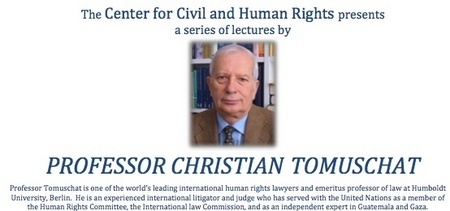Professor Tomuschat will discuss public aspects of this case in which he serves as one of the agents for Germany in proceedings against Italy before the International Court of Justice (ICJ) in the Hague. In recent years, Italian courts have ordered the German State to pay damages to victims of Nazi war crimes committed during Germany’s occupation of Italy between 1943 and 1945. Germany alleges that “[t]hrough its judicial practice . . . Italy has infringed and continues to infringe its obligations towards Germany under international law” and has “repeatedly disregarded the jurisdictional immunity of Germany as a sovereign State.” This important case will allow the Court to clarify the complex issues surrounding when a State can be sued in the domestic courts of another country for official, governmental activities that violate human rights.
Lecture co sponsored by the Nanovic Institute for European Studies.
The Center for Civil and Human Rights is pleased to host Professor Christian Tomuschat at Notre Dame Law School February 7-11, 2011.
Poster of events for Christan Tomuschat
Professor Christian Tomuschat, one of the world’s leading international human rights lawyers, is emeritus professor of law at Humboldt University, Berlin. Before taking the chair of international law at Humboldt, he taught for 22 years at the Law Faculty of the University of Bonn where he directed the Institute of International Law. From 1977 to 1986, Professor Tomuschat was a member of the United Nations Human Rights Committee, the treaty body created by the International Covenant on Civil and Political Rights; from 1985 to 1996, he served on the International Law Commission (President in 1992). From 1990 to 1993, he was the United Nations special rapporteur on the human rights situation in Guatemala; from 1997 to 1999, he chaired the Truth Commission established by the Guatemalan Peace Accords, known as the Commission for Historical Clarification. His judicial experience includes serving as judge of the administrative tribunals of the Inter-American Development Bank and the African Development Bank. He has represented the Federal Government of Germany before European Court of Justice in Luxemburg AND the European Court of Human Rights in Strasbourg and, currently, before the International Court of Justice in the Hague. Professor Tomuschat served as a member of the International Commission of Jurists (Geneva) from 1981 to 1996. He was the President of the German Society of International Law from 1993 to 1997. He was admitted to the Institut de Droit International in 1997.
He is the author of numerous books and articles. Among his recent publications are Human Rights – Between Idealism and Realism, Oxford 2003 (2nd ed. 2008) and The Statute of the International Court of Justice. A Commentary, Oxford 2006 (co-editor and author).
Additional Events
“Human Rights and the Gaza Conflict” (Wednesday, February 9, 12:30pm, 3140 Eck Hall of Law)
Prof. Tomuschat will discuss his service on a panel of independent experts tasked by the United Nations to “monitor and assess any domestic, legal or other proceedings undertaken by the Government of Israel and the Palestinian side” in light of the allegations in the report of the UN Independent Fact-Finding Mission into the Gaza conflict – also known as the Goldstone Report. That report alleged that both Israeli forces and Palestinian militants were guilty of serious human rights violations and breaches of humanitarian law during “Operation Cast Lead,” which took place from December 2008 to January 2009.
“What is General International Law?” (Thursday, February 10, 12:30pm, 3140 Eck Hall of Law)
Prof. Tomuschat will lecture on the concept of general international law. Given the multiplicity of subjects and the overlapping areas of activity covered by international law, Prof. Tomuschat will explore whether a common set of rules – collectively known as “general international law” — may be said to exist.
